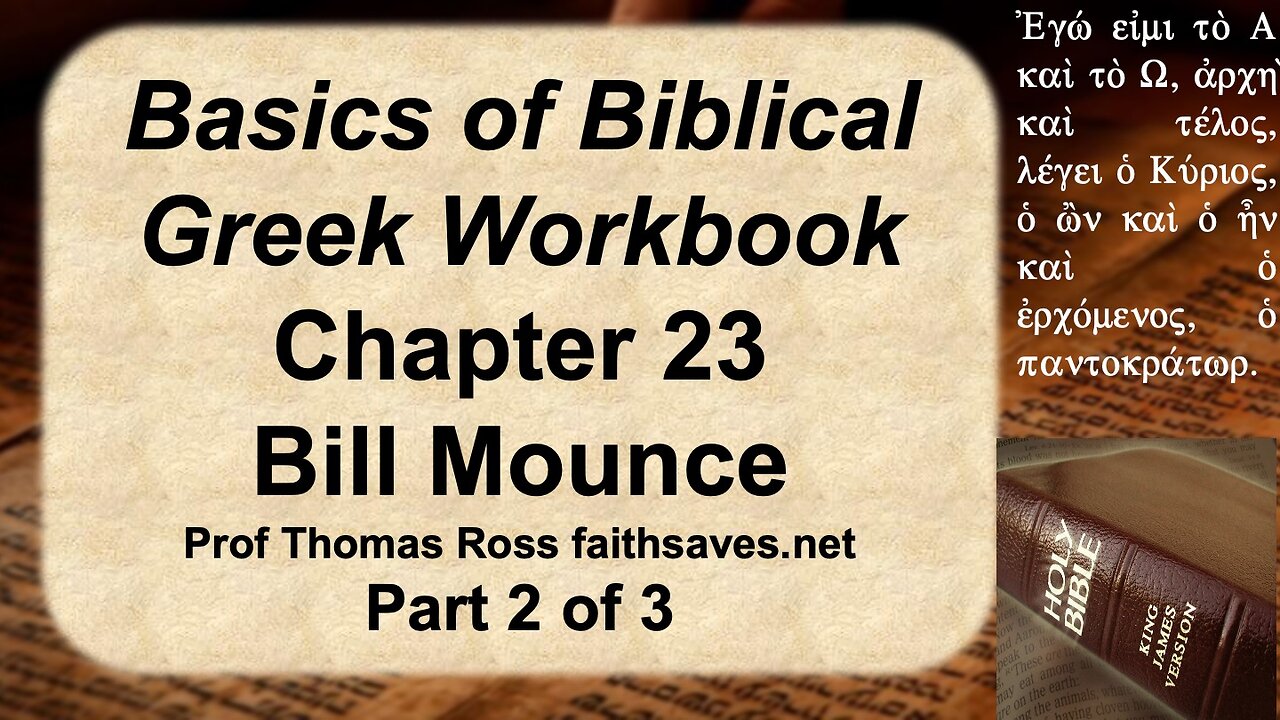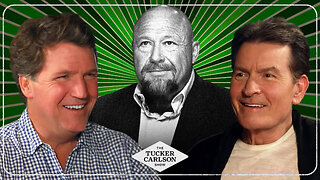Premium Only Content

Basics of Biblical Greek Workbook, Bill Mounce, Chapter 23 (2 of 3): New Testament / Koine Greek 33
Lecture 33 in New Testament or Koine Greek continues chapter 23 of William (Bill) Mounce’s Basics of Biblical Greek Workbook, the first aorist active indicative verb and the aorist middle indicative verb. The lecturer is independent Baptist professor Thomas Ross. Both William D. Mounce, Basics of Biblical Greek (Workbook), ed. Verlyn D. Verbrugge, Third Edition. (Grand Rapids, MI: Zondervan, 2009) or William D. Mounce, Basics of Biblical Greek Workbook, Fourth Edition (Grand Rapids: Zondervan, 2019) are acceptable for this class.
This video covers the second part of Basics of Biblical Greek Workbook for chapter 23. Translation exercises 4-10 and the first additional exercise (11) are covered. Part three (video 34) covers additional exercises 12-20. Part one (video 32) covered all the parsing exercises, all the warm-up exercises, and translation exercises 1-3. This video also contains an extensive discussion of the Greek middle voice, comparing the discussion of the middle in Bill Mounce's Basics of Biblical Greek, 3rd and 4th editions, where significant change has taken place in the discussion of the middle.
In chapter 23 of Basics of Biblical Greek (either the 3rd or the 4th edition) students learn the 1st aorist indicative. First aorist indicative verbs are formed by adding an augment, tense formative (σα), and secondary endings to the aorist tense stem, resulting in verb forms such as ἔλυσα. Most Greek verbs have a first aorist, not a second aorist. The aorist, whether it is a 1st or a 2nd aorist, portrays an action that normally occurs in the past and is snapshot or undefined in its aspect. The difference between the 1st and 2nd aorists has to do with how the word is formed, not with its meaning.
Some or all of the following texts of Scripture are translated:
4. John 9:35
5. John 20:13
6. Mark 5:20
7. John 1:39
8. 1 John 5:13
9. Mark 6:30
10. Matthew 7:22-23
Exercise 11 is a sentence created by Dr. Bill Mounce.
In Basics of Biblical Greek, William Mounce, 3rd edition, the middle voice is discussed in chapter 25. But in the 4th edition, the middle appears in chapter 18.
The present middle/passive in Greek is formed by joining the present tense stem with the connecting vowel and the primary middle/passive endings. The primary middle/passive personal endings are μαι, σαι (which changes to ῃ when joined with the connecting vowel), ται, μεθα, σθε, νται.
In the present, imperfect, and perfect the form of the middle and of the passive is the same. Readers must make a choice about whether a form is middle or passive. A form without any context, can be labelled “middle/passive,” but when a verb is in a sentence, context which will let one know if it is middle or passive. In the future and the aorist there is a different form for the middle and the passive, so one knows for sure, even without examining the context, from the form that one is looking at an actual middle, not a passive.
Mounce writes in his 3rd edition:
• If a verb is in the active, then the subject does the action of the verb.
• If the verb is in the passive, then the subject receives the action of the verb.
• The general definition of the middle voice is that the action of a verb in the middle voice in some way affects the subject. I call this the “self-interest” nuance of the middle.
Mounce proceeds to discuss the Indirect Middle, where the subject does the action of the verb to the direct object, but the participation of the subject is emphasized. He then discusses the Reflexive (Direct) Middle. In this case, the subject does the action of the verb and also receives the action. The reflexive middle was a common use of the middle in Classical Greek. However, if the subject of the verb performs an action to itself, Koine Greek usually required the reflexive pronoun, a use called the Redundant Middle. For the Deponent Middle, the middle has the same meaning as the active. Only a few verbs have both a middle deponent and a passive deponent form.
In Mounce's 4th edition, the discussion of the middle has developed. Mounce writes:
Formerly, the middle was basically defined in a narrow sense of being reflexive or reciprocal. If you wanted to express either of these ideas, the verb would be in the middle voice. Paradigms often define the inflected form of a middle verb with a phrase like “for himself.”
However, scholarship today is starting to give the middle voice a much wider definition. The essence of the middle voice is that the subject is affected by the action of the verb. The subject still does the action of the verb, and if there is a direct object it still receives the action of the verb, but in some way the action comes back and affects the subject. This is called subject-affectedness.
Many times the subject affectedness will be so slight that it can hardly be felt.
Mounce also provides categories of verbs that employ the middle voice in an advanced information section.
#mounce #greek #nt #koine #workbook
-
 LIVE
LIVE
Dr Disrespect
3 hours ago🔴LIVE - DR DISRESPECT - ARENA BREAKOUT: INFINITE - STORM EVENT
16,715 watching -
 LIVE
LIVE
Barry Cunningham
3 hours agoPRESIDENT TRUMP SPEAKS ON JAMES COMEY INDICTMENT! MORE TO COME! DELICIOUS LIBERAL MELTDOWNS!
1,468 watching -
 1:33:51
1:33:51
Steve-O's Wild Ride! Podcast
1 day agoJohn C. Reilly's Surprising Connection To Jackass (And Beef With Weeman!)
7132 -
 LIVE
LIVE
StoneMountain64
51 minutes agoBattlefield 6 News and Extraction Gaming
236 watching -
 1:00:03
1:00:03
NotTheBee
7 days agoJimmy Kimmel CANCELED? | Fake News, Free Speech & Media Meltdown
4651 -
 2:13:30
2:13:30
Side Scrollers Podcast
4 hours agoUK Introduces MANDATORY Digital ID + Dallas ICE Shooting BLAMED on Gaming + More | Side Scrollers
21.1K3 -
 1:54:17
1:54:17
The Charlie Kirk Show
2 hours agoCharlie's Last Trip + What's Next + AMA | Erika Kirk, Mikey McCoy | 9.26.2025
60.2K122 -
 1:02:53
1:02:53
The Quartering
1 hour agoMAGA Kid Kidnapped, Hasan Piker Meltdown, Vivek Fights For Alex Jones & More
42.5K19 -
 32:49
32:49
Simply Bitcoin
1 day ago $0.39 earnedBitcoin Crucible w/ Alex Stanczyk | EP 1
535 -
 1:57:37
1:57:37
Tucker Carlson
1 hour agoCharlie Sheen’s Craziest Hollywood Stories and Why He Refuses to Believe the Official Story of 9/11
5.71K24